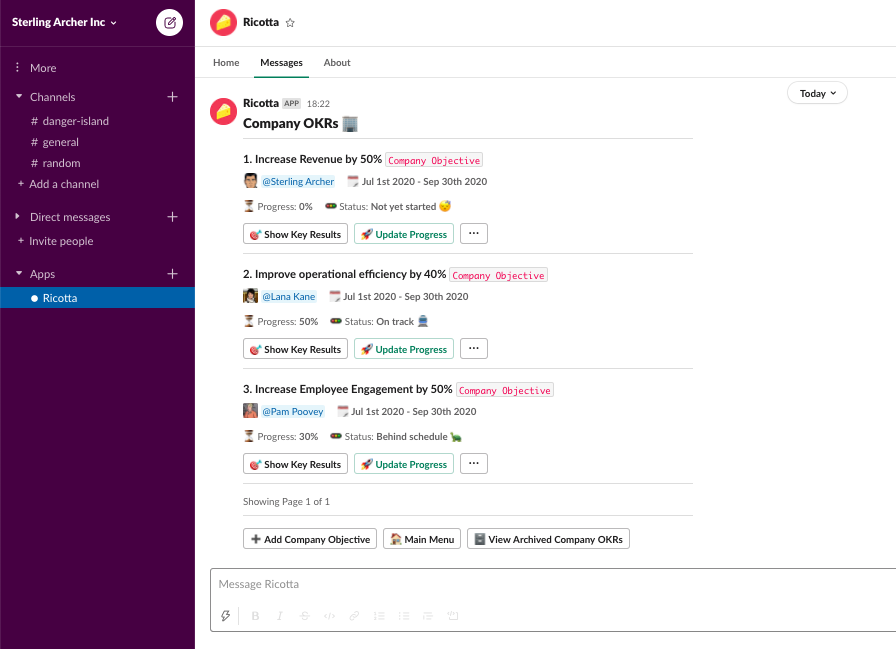How OKRs help remote teams to be extra coordinated
While organisations have been working towards making their remote team as coordinated and the work as rewarding as possible, goal setting and performance tracking can be one of the toughest things to crack. This is where OKR methodology comes in handy to keep all teams aligned and focused.
Let’s talk about OKRs and why they are now becoming even more essential for businesses.
But what is OKR?
OKR (Objectives & Key Results) is a goal-setting methodology that helps organisations focus on what matters the most. The ‘O’ in OKR meaning ‘Objectives’ which are typically the goals you want to focus on. ‘Key Results’ are measurable and help you track progress and understand what the outcome of the objective looks like.
OKRs are used by large organisations such as Google, Intel, Facebook, Twitter, LinkedIn, Airbnb, etc.
Why OKRs?
London Business School conducted a survey of 11,000 senior executives and managers and guess what? Only one-third of them knew their company’s top three priorities!
So that answers our question- Organisations need a more effective way to communicate their top goals and priorities. OKRs can help by bringing in transparency and helping organisations set measurable goals. We can give you 5 solid reasons why your team should adopt OKRs.
Let’s take the example of a hypothetical ed-tech firm based in LA - STEMtastic. To meet the company’s long-term goals in a timely manner, constant communication across the product, design and marketing teams is necessary. Hence, they opt for OKR softwares like Ricotta to make their workflow smoother.
Now that we have established that OKRs are necessary, let’s talk about how they can be beneficial for remote teams
1. Focus on the right things
OKRs make your goals extra defined which helps in clarity and effective communication among remote teams. By using OKRs for goal setting, employees know exactly what every team is working on and keeps everyone on the same page.
2. See real results even while working remotely
With remote teams, constant communication is difficult to maintain, thus checking on the team’s progress constantly can be a tedious task. Since OKRs are measurable, tracking them makes it easier to see progress and you tend to get real results very often.
3. Keep your team motivated
OKR software helps remote teams to be aware of broader organizational goals. Employees can easily align their personal objectives to an organization’s goal and be aware of their overall contribution to the company. This enables them to understand that they matter to the success of the organization.
4. Have your metrics and goals in one place
Through most OKR softwares, data is easily accessible for managers and team members alike. The top priorities of the company can be highlighted in a more effective way and moreover, the metrics and progress can be regularly monitored.
![]()
OKR examples
OKRs can be at a company, team or personal level. Let’s take the example of the ed-tech company, STEMtastic and analyse how their OKRs differ at a company, team and personal level.
Company level
The company wants to launch a STEM toy that acts as a learning supplement for the homeschool community (ages 5 to 12).
Objective: Launch an MVP
KR1 – Get 20 homeschool co-ops to try out the product and give feedback
KR2 – Get a 15% conversion on website orders
KR3 – Get a rating of 4.5+ on Amazon
Team level
The marketing team of STEMtastic wants to improve the company’s social media reach across all channels.
Objective: Increase social media reach
KR1 – Increase the number of Instagram followers to 10K
KR2 – Increase social media conversion rate by 3X
KR3 – Start a Pinterest page with a monthly reach of 50k+
Personal level

An employee at STEMtastic wants to broaden his email marketing skills.
Objective: Improve email marketing skills
KR1 – Do a course on Udemy
KR2 – Read 10 blogs daily about email marketing
KR3 – Create a Mailchimp account and send 100 emails
How to implement remote OKRs?
1. Introduce OKRs to your team
The essence of good communication when working remotely is to be transparent and do regular check-ins. Your team should always be aware of the company and team objectives for their contribution to have maximum impact.
Thus, it is crucial for the team to be involved in the goal-setting process to create a culture of open communication and build trust with the team. Have an introduction session with the team so that they have a deep understanding of the OKR goal-setting process.
2. Brainstorm OKRs
After your team is introduced to objectives and measurable key results, ask them to come up with their own OKR ideas. All these ideas can be discussed as a team for a more effective goal setting. Remember, to keep the OKRs realistic and non-linkable to an employee’s work performance.
3. Use an OKR tracking tool
The best way to execute OKRs is to use OKR software to kickstart your journey. If you use Slack in your organisation, tools like Ricotta OKR, which are implemented in just one-click can come in handy.
Why use Ricotta OKRs for your team?
-
Everything can be done on Slack
Employees can access all the functionalities of Ricotta on Slack and don’t have to log in to a separate website, making it easier to implement and adopt Ricotta among remote teams.
-
Automated OKR Reminders
Automated OKR reminders on Slack mean you spend little time on OKR implementation and more time on growing your business.
- Collaborate easily
Use Ricotta OKRs to ensure distributed remote teams collaborate smoothly and asynchronously.
4. Analyse, track and make adjustments
Now that the entire process is clear and has been implemented, it is time to track and analyse! Weekly check-ins are extremely crucial to understand the health of your OKR strategy.
Be open-minded and flexible when it comes to the OKR methodology and don’t be afraid to make adjustments if something isn’t working. Do quarterly reviews to see what everyone has worked on, achieved and most importantly - learnt!
Things you need to do to make your remote OKRs a success
- Don’t set too many objectives for your company
- Keep your key results flexible
- Team members should be involved in the OKR setting process
- OKRs should be challenging, not impossible
- Don’t link OKRs to employee performance
- Key Results should be measurable
- Do regular OKR check-ins with your employees
What’s next?
Yes, managing remote teams and setting goals can be tedious. But what are OKRs for? Start making collaborations among teams easy and focus on the right stuff for your organisation. Invest time in OKRs and your team would thank you!
So what are you waiting for? Start implementing OKRs with Ricotta now. A free 14-day trial awaits you to make your slack collaboration seamless.

Follow us on Twitter for all about managing teams, Remote OKRs and more!